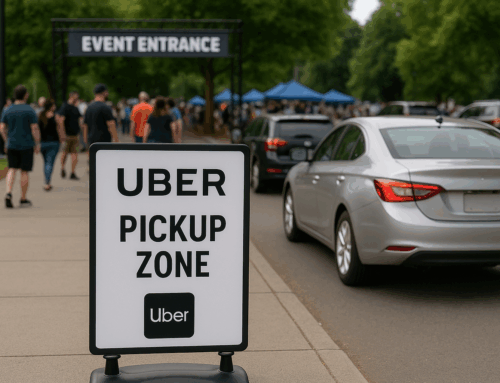When planning a ticketed event, implementing effective access control measures is crucial. Whether you’re managing a small gathering or a large-scale festival, how you handle event access control can significantly impact your event’s overall success and security. In this blog post, we’ll explore the best practices for access control at ticketed events, ensuring a smooth and secure experience for organizers and attendees.
Importance of Access Control in Ticketed Events
As an event planner, understanding the importance of event access control is key. An access control system is designed to manage who enters your event, ensuring that only authorized individuals gain access. This enhances security and instills a sense of reassurance, helping to prevent bottlenecks and unauthorized entry and ultimately boosting your confidence in the event’s success.
Key Factors of an Access Control Strategy
-
Multi-Tiered Check-Ins: Handling VIP vs GA: One of the most critical aspects of event access control is managing different types of attendees, such as VIPs and General Admission (GA) ticket holders. Implementing multi-tiered check-ins allows you to customize the entry process for each group, ensuring that VIPs receive the exclusive experience they expect while GA attendees are processed efficiently. This approach maintains order and gives you a sense of control over the event’s flow, enhancing the overall attendee experience.
-
Technology Flexibility: An adaptable access control system is essential because your event’s needs vary. Whether it’s a sudden change in venue layout or an unexpected increase in attendance, your access control technology should be flexible enough to accommodate these changes. A system that integrates with your existing event management tools and offers customization options will provide the necessary adaptability.
-
Offline Solutions for Uninterrupted Operations: Technology is a powerful tool, but relying solely on online systems can be risky. What happens if the internet goes down? That’s where offline solutions come in. By using an access control app that can scan tickets even when offline, you can ensure that your event runs smoothly, regardless of connectivity issues. This redundancy is crucial for maintaining control and avoiding disruptions.
-
Contingency Plans for Access Control Failures: Even the best technology can fail, which is why it’s essential to have contingency plans in place. Printed check-in lists serve as an emergency backup, allowing staff to verify and admit attendees if the digital system fails manually. Preparing for these scenarios ensures your event continues without significant hiccups, maintaining security and attendee satisfaction.
-
Defined Scanning vs. Box Office Roles: Clearly defining the roles of your staff is another best practice in event access control. Scanning and box office duties should be distinct, with staff members explicitly trained for their assigned tasks. This separation of responsibilities increases efficiency and reduces the likelihood of errors during the check-in process.
-
Visual Checks and Training: While technology plays a significant role in access control, it’s important to recognize the human element. Incorporating visual checks of tickets as a backup to technology is a smart move. For example, color-branded tickets can quickly identify different access levels, such as VIP or GA, by day or area. Training your staff to recognize these visual cues ensures that your event’s access control remains strong even if technology fails.
Advanced Technologies for Access Control
Biometric Authentication
As events grow in scale and complexity, biometric authentication is becoming an increasingly popular access control method. Options like fingerprint scanning and facial recognition provide an added layer of security, though weighing the pros and cons, such as cost and privacy concerns, is important.
Mobile Ticketing and Contactless Solutions
In today’s digital age, mobile ticketing is not just convenient—it’s essential. Mobile-based access control solutions offer a seamless, contactless entry experience for attendees, which is important in the context of health and safety concerns. Implementing contactless options also reduces physical contact and speeds up entry, making you and your attendees feel more at ease and comfortable.
Integration with Event Management Systems
Integrating your access control system with your event management platform can greatly enhance operational efficiency. The integration allows you to check real-time updates and create a more cohesive experience for your team and attendees, making managing every aspect of your event easier.
Best Practices for Managing Access Control During Events
Pre-Event Planning and Testing: Effective access control begins long before the event itself. Planning and testing your systems is essential to know potential issues and ensure everything runs smoothly on the event day.
Staff Training and Communication: Well-trained staff are the backbone of successful event access control. Ensure that your team is familiar with the access control procedures and that clear communication channels are in place to handle any issues during the event.
Handling Emergencies and Unexpected Situations: No matter how well you plan your event, some unexpected issues can arise. Being prepared with a robust emergency response plan is key to managing any access control challenges that come your way, ensuring that your event remains secure and well-organized.
Why EventHub Stands Out
Access Control Solutions
EventHub offers a comprehensive suite of access control solutions created to meet the needs of event planners. From multi-tiered check-ins to offline scanning capabilities, EventHub ensures your event is secure, adaptable, and efficient.
Seamless Integration with Event Management Tools
Our platform seamlessly integrates access control with other event management tools, enhancing the overall experience for organizers and attendees. This integration helps streamline operations, making managing your event from beginning to end easier.
Conclusion
Summary of Key Points: Access control is vital to any ticketed event, impacting security and attendee satisfaction. By implementing best practices such as multi-tiered check-ins, technology flexibility, offline solutions, and well-defined roles for staff, you can ensure a smooth and secure event. To make the most of your event access control, it’s important to follow these best practices and tailor them to the unique needs of your event.
Ready to take your event access control to the next level? Explore EventHub’s advanced access control features and discover how we can help your event succeed.
Get a demo to learn more about how EventHub Ticketing can help your event:
FAQs: Access Control for Ticketed Events
What is access control in the context of ticketed events?
Access control refers to the systems and processes that manage who can enter an event, ensuring that only authorized individuals gain access.
How can biometric authentication improve event security?
Biometric authentication adds a layer of security by using biological traits, such as fingerprints or facial recognition, to verify identity.
What are the benefits of mobile and contactless access control?
Mobile and contactless access control provides a convenient, efficient, and secure way for attendees to enter events, reducing physical contact and speeding up the entry process.
How should I prepare my staff for access control management?
Proper training is essential. Ensure your staff are well-versed in the access control procedures and understand their specific roles and responsibilities.
How does EventHub enhance access control for events?
EventHub provides robust access control solutions that integrate seamlessly with your event management tools, offering flexibility, security, and efficiency.





